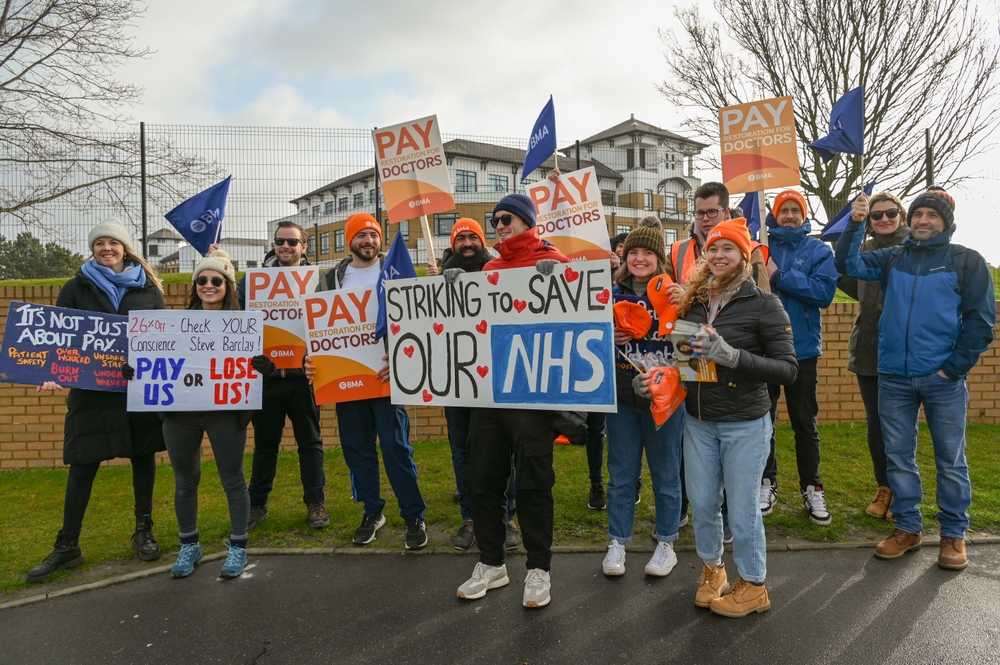The British Medical Association’s (BMA) consultants committee has accepted the government’s offer on pay for consultants in England.
The offer includes reform to the pay review body, the Review Body on Doctors’ and Dentists’ Remuneration (DDRB).
The result brings to an end a year-long dispute that involved unprecedented industrial action by consultants.
One year ago, the BMA confirmed its junior doctor members across England would strike for three days from Monday 13 March.
But 83% of the BMA consultant members voted in favour of the government offer in a referendum that took place between 14 March and 3 April.
Some 22,700 consultants took part in the referendum, a turnout of 61.9%. A total of 18,778 (82.7%) voted in favour of the offer, and 3,922 (17.3%) voted against.
Following this the BMA’s consultants committee has accepted the offer on behalf of the profession.
The deal represents an improvement on a previous offer that was rejected by consultants in January and follows negotiations between the BMA and the government since then.
The offer includes changes to the DDRB, including returning the pay review body to its original purpose and independence.
DDRB changes
From next year, there will also be changes to the way the DDRB will appoint members, and the government will no longer be able to constrain its remit with reference to inflation targets and economic evidence.
The DDRB’s terms of reference will also be changed to include developments in earnings over time in the context of long-term trends in the wider labour market, comparator professions, and relevant international comparators.
The BMA said: “The changes mean that the DDRB can no longer ignore the historical losses that doctors have suffered or the fact that countries abroad are competing for UK doctors with the offer of significantly higher salaries.”
Pay scale reform
The offer also improves on the previous proposal to reform the consultant pay scale.
The BMA said: “This will still result in fewer pay points and reduce the time it takes for a consultant to reach the top of the scale.
“However, it now includes a 2.85% (£3,000) uplift for those who have been consultants between four and seven years, who under the original offer received no additional uplift, thereby addressing a key concern of BMA members.”
The pay offer is in addition to the 6% awarded during the DDRB process last summer and is separate to the pay award following the outcome of the DDRB process for 2024/25.
Consultants have spoken
Dr Vishal Sharma, BMA consultants committee chairman, said: “The last year has seen consultants take unprecedented strike action in our fight to address our concerns about pay and how the supposedly independent pay review process was operating.
“After years of repeated real-terms pay cuts, caused by government interference and a failure of the pay review process, consultants have spoken and now clearly feel that this offer is enough of a first step to address our concerns to end the current dispute.
“However, it’s now imperative that the DDRB utilises its independence to restore doctors’ pay and prevent any further disputes from arising.
“We’ve reached this point not just through our tough negotiations with the government, but thanks to the resolve of consultants, who took the difficult decision to strike, and did so safely and effectively, on multiple occasions, sending a clear message that they would not back down.
“At the heart of this dispute was our concern for patients and the future sustainability of the NHS. Without valuing doctors, we lose them. Without doctors, we have no NHS and patients suffer.
“But the fight is not yet over. This is only the end of the beginning, and we have some way to go before the pay consultants have lost over the last 15 years has been restored.
“Therefore, all eyes will be on this year’s pay review round, recommendations from the DDRB and response from the government.
“Consultants have shown they are not afraid to act when they need to, and ministers, whether present or future, should be warned that we expect to be treated fairly and if the government fails to do so in future, we will once again find ourselves in the midst of an industrial dispute.
“It’s in the government’s and DDRB’s gift to avoid this, starting with the pay round for the coming year.”
